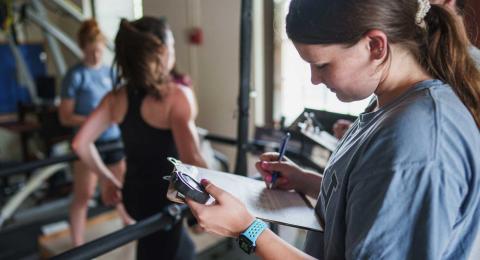
Can’t attend Admitted Student Visit Day? No problem! We’ve gathered key resources to help you discover more about UNH’s College of Health & Human Services (CHHS) and get a feel for life as a Wildcat. Start exploring below and get excited about your future at UNH!
Take a look at resources that offer an inside view of academic programs, student life, and career opportunities at UNH’s College of Health & Human Services (CHHS). Whether you're planning your next steps or just getting to know UNH, these tools will help you picture your future as a Wildcat.
You’re invited to attend the College of Health and Human Services (CHHS) Undeclared Virtual Admitted Student Session on Wednesday, April 16. Learn from the CHHS academic advisors and peer mentors everything from the orientation process, classes taken in the first year, and more about the first-year experience as an undeclared student. Get your questions answered to help you prepare for academics at CHHS.
Register for the CHHS UNDECLARED Virtual Session
Can’t attend Admitted Student Visit Day? No problem! We’ve gathered key resources to help you discover more about UNH’s College of Health and Human Services (CHHS) and get a feel for life as a Wildcat. Start exploring below and get excited about your future at UNH!
Real-world Impact
Our students gain hands-on experience through research and internships, applying classroom knowledge to real-world challenges and preparing for successful careers in health and human services.
Tour CHHS and Campus Virtually
There are many paths to UNH. This one's just a click away. We're bringing the best of UNH right to you, from our stunning New England campus to the possibilities of our no-limits location. Don't just connect — explore.
360-Virtual Campus Tour

Explore Frequently Asked Questions
CHHS Programs
Looking for additional details about your specific program? Visit our program detail pages to learn more.
CHHS Facilities
Register for an upcoming campus tour to see where you'll live and learn as a Wildcat.
Don’t hesitate to reach out directly to the CHHS Dean's Office: unh.chhs@unh.edu or to a member of the CHHS undergraduate advising team: chhs.advising@unh.edu. You can also call (603) 862-1178.
Each of our academic departments and programs in CHHS offers detailed information about their curriculum, course planning, faculty and staff, and student opportunities. You can start your exploration here: https://chhs.unh.edu/.
Follow CHHS on Instagram, Facebook, and Linkedin where we regularly share student, faculty, and program highlights.
As the state, public, flagship university in New Hampshire, CHHS students experience a vibrant learning community studying with faculty who are engaged in leading-edge and practice and who are committed to teaching excellence. For a research-intensive university, UNH pays uncommon attention to undergraduate education.
Our academic programs in CHHS are nationally accredited, and our students demonstrate extremely high pass rates on all relevant licensure and certification exams. CHHS students graduate from UNH ready to move successfully into their career or into graduate programs.
We provide our students with extensive opportunities for hands-on learning to support skill development. These include opportunities through simulation, working with individuals and families in one of our many on-campus clinics and centers (see https://chhs.unh.edu/centers-institutes), and practicing in clinical and internship placements with licensed professionals.
As a CHHS student you will have the opportunity to participate in our ACE First Year Experience Program (ACE = Academic and Career Engagement) where you will work one-on-one and in group settings with academic coaches, faculty mentors and peer advisors to explore our health majors and careers.
We offer our ACE Program for all first-years students in the college. The program consists of the following:
· Academic coaching: the coaching term describes a much more involved process than advising – meeting individually with your academic coach, inside and outside of seminar, talking about the whole college experience, not just classes and academic progress. Coaches spend a lot of time listening and helping students get connected to resources quickly and seamlessly.
· ACE seminar: all first-year students will be in credited academic seminars with their peers. We bring in faculty from our majors and campus resources each week and leave time in seminar for small group chats with peer mentors.
· Peer mentoring: all first-year students have an upper-class ACE peer mentor to help guide them through their transition and college navigation process. The peer mentors are also in seminar with you each week.
. Faculty mentoring: faculty from the majors will be connected to the seminar so are available for questions at various times throughout the semester.
At the university level, the Center for Academic Resources (CFAR) employs educational counselors and peer mentors to assist UNH students to reach their academic goals. UNH also offers the Knack platform that helps connect students to tutors across a wide range of courses.
We recommend that our CHHS students join two student organizations or clubs in their first year: one that is purely fun or for the heart and one that is related to an educational or professional interest. You can find more about student organizations and clubs at UNH: https://unh.presence.io/.
There are a number of student organizations specifically for students in CHHS, and these include:
American Sign Language Club
Association of Exercise Science Students
National Student Speech-Language-Hearing Association
Sport Careers Club
Student Nursing Organization
Student Occupational Therapy Association
Student Organization for Health Leadership
Students of Social Work
The Recreation Society
HOSA - Future Health Professionals
Our 3-year average placement success rate for our recent CHHS graduates is 95%. CHHS has a dedicated Career and Professional Success Director and Career Advising designed to support the specific needs for CHHS students to engage in career exploration, build career readiness, and support professional success: https://chhs.unh.edu/careers.
The College of Health and Human Services awards about $350,000 in scholarships each year to our continuing students. You can explore the scholarships available to our current students here: https://chhs.unh.edu/academics/scholarships. Each year, the college announces the availability of scholarship support, and students are asked to apply for consideration. The money is then made available for the following academic year.
First-year students in CHHS can choose to live in our living and learning community in McLaughlin Hall (https://www.unh.edu/housing/communities). CHHS first-year students participate in the Academic and Career Engagement (ACE) program. Choosing to live in this CHHS: ACE Learning Community will extend the benefits of ACE to your residential life experience. First-year students who select to join the CHHS: ACE Learning Community will live together in McLaughlin Hall and be able to extend and expand the supports, resources, and connections of ACE.
Close to ¼ of our first-year students in CHHS come in as CHHS Undeclared students!
Our Undeclared ACE Seminar is specifically designed to help our undeclared students learn about all our majors. The ACE Team will be sure you have all the information you need to successfully choose the right path for you and the tools you will need for application into your major of choice. Also, on this ACE webpage you can find out internal transfer requirements – under the advising tab: https://chhs.unh.edu/academics/academic-career-engagement-program
Program Information and Frequently Asked Questions
College of Health and Human Services Frequently Asked Questions
What does it mean to choose a major in UNH’s College of Health and Human Services?
Students come to UNH’s College of Health and Human Services (CHHS) because they want to contribute to the health and well-being of individuals, families, and communities. CHHS’s eight departments offer a wide range of majors where students are prepared to be health care and social service leaders working across a variety of settings (e.g., hospitals, schools, community agencies, sport, and recreation) and serving people throughout the lifespan (from infancy to older adults). Our tagline in CHHS is a quote from Robert Ingersoll, “We rise by lifting others” and CHHS faculty, staff, and students share a value of service to others.
What kinds of educational experiences are unique to UNH’s College of Health and Human Services?
- Exceptional and dedicated faculty. Students in CHHS are taught by faculty and practitioners who work at UNH because they are invested in teaching and mentoring students.
- Applied learning. Students in CHHS begin to apply their classroom learning in applied and hands on ways sometimes as early as the first year. Almost 100% of our students engage in one or more clinical, fieldwork, and internship experiences.
- Discovery science. Students in CHHS can work alongside faculty who are renowned in their fields and contribute to research driving new knowledge and treatment, intervention, and prevention approaches.
Are UNH’s College of Health and Human Services students successful?
In the College of Health and Human Services we have around a 98% success rate annually. This means students are either employed or going on to further education within six months of graduation. For our professional programs that require certification or licensing exams, our students perform significantly higher than national averages (e.g., pass rates above 95%).
- Students have access to a dedicated Career and Professional Success team who provide one-on-one appointments, career drop-ins, and classroom presentations all geared towards personal growth and professional success.
- Hundreds of employers are brought to campus annually for career and internship fairs, panel discussions, and informational tabling. Students are able to speak with employers directly to create professional connections to support future goals.
How does UNH’s College of Health and Human Services support first year students?
- All first year CHHS students are part of our Academic and Career Engagement (ACE) Program (https://chhs.unh.edu/academics/ACE). The ACE First Year Experience Program is designed to support students through the transition from high school to college. Every CHHS first year student is provided with a professional advisor, a faculty mentor, and a peer mentor to help them navigate academic and co-curricular resources.
- Students in the ACE Program participate with their peers in an academic seminar in the fall semester and a career seminar in the spring semester. These seminars help students learn about CHHS majors and explore career choices, goals, and the resources and opportunities available to students at UNH, such as academic guidance and support for personal well-being.
What types of facilities are part of UNH’s College of Health and Human Services?
Here are just some of the facilities available to CHHS students:
- Health Sciences Simulation Center (HSSC): New, state of the art simulation labs that mimic hospital, clinic, primary care and other health care settings.
- Biomechanics and Motor Control Laboratory: Fully equipped lab to study neuromuscular responses during exercise, cognitive processing during motor tasks, biomechanics of daily activities, and gait kinematics and kinetics.
- Child Study and Development Center (CSDC): Laboratory school that serves infants through preschool age children while providing students with an experimental teaching and learning environment.
- Speech Language and Hearing Center: Provides full range of speech, language and communication services to both children and adults while also serving as a clinical training program for students.
- Telehealth Practice Center: Lab is equipped with state-of-the-art telehealth practice rooms, a demonstration home environment, telehealth home sensors and monitors, a telepresence robot, telemedicine carts, and more.
How can you learn more about UNH’s College of Health and Human Services?
Explore CHHS’s website: https://chhs.unh.edu/. Follow CHHS on Social Media. Email us at
Academic and Career Engagement (ACE) Program
- The Academic and Career Engagement (ACE) Program in the College of Health and Human Services provides our first-year students with an environment that encourages academic success in the transition from high school to college. Through personalized academic and career coaching, this first-year experience program assists students with navigating academic and co-curricular resources, developing skills in active learning, reflection, and decision making, and exploring vast career options and alumni connections - all the while fostering a community of belonging and involvement within CHHS and UNH.
- Members of the ACE Program participate in an academic seminar in the fall semester and a career seminar in the spring semester of freshman year. These Seminars help students learn about CHHS majors and explore career choices, goals, and the resources and opportunities available to students at UNH, such as academic guidance and support for personal well-being. Every CHHS student has an ACE peer mentor and an ACE academic coach, and a faculty mentor who are available to meet on a regular basis.
How easy is it to apply into my major of choice?
Each major has clearly laid out requirements for application. We offer this information to students in our very first seminar. A representative from each major comes to the undeclared seminar specifically, to talk through the process and the expectations. Our academic coaches work closely with our undeclared students to follow up and make sure they understand the expectations and requirements for application into each major. If resources are needed to reach goals, we help make those connections. We provide advice and resources to help students make the best choices that align with their interests and strengths
What if I just don’t know what I want to major in?
- Many of our undeclared students are unsure of a major choice. This is why we have each major in the college come to undeclared seminar to explain the major and the application process. There have been many times when students shift their thought process after one of these major presentations.
- Our one-on-one conversations with students frequently involve interest exploration. Faculty representatives from each major are available to sit and talk with students individually about their curriculum, career opportunities, internships, and research.
What academic support is provided for students?
- Close working relationships between faculty and students is a hallmark of a UNH education, and faculty assistance in navigating the academic challenges is widely available, including through the Center for Academic Resources (CFAR). Other resources offered through the collegeinclude the Mathematics Center (MaC) and the Connors Writing Center.
- At the university level, the Center for Academic Resources (CFAR) employs educational counselors and peer mentors to assist students reach their academic goals.
- At the college level, CHHS offers academic support to students through strong faculty and student relationships and exceptional academic advising support. If students are struggling academically, they are encouraged to participate in our AIM program (Academic Improvement Model). Students participating in AIM will:
- Become more self-aware as they work with an academic coach to review prior behaviors
- Set, monitor, and evaluate realistic academic goals
- Develop or strengthen navigation skills
- Begin to improve their academic lives either through changes in major or GPA
Can I be involved in things other than academics during my first year at UNH?
Yes! We talk with each student in our individual meetings about the need for balance, It is very important to feel connected to campus and to CHHS, so we strongly encourage active engagement in student organizations and activities. Many of our students are involved in the associations and organizations listed below, but this is not an exhaustive list of the possibilities.
What professionally oriented student organizations are available to students in the college?
https://chhs.unh.edu/academics/student-clubs-organizations
- CSD NSSHLA- National Student Speech Language Hearing Association CSD ASL Club - American Sign Language Club
- HMP SOHL - Student Organization for Health Leadership KIN - EXSC - AESS - Association of Exercise Science Students KIN – AT- SATO - Student Athletic Training Organization KIN - HPE - PED Club ?
- KIN – HS – HOSA Chapter
- KIN – SPST - Sport Careers Club
- NURS - Sigma Theta Tau International Honors Society
- NURS SNO - Student Nursing Organization OT - Pi Theta Epsilon Honors Society
- OT - SOTA - Student Occupational Therapy Association RMP - The Recreation Society
- SW - Phi Alpha Honors Society
- SW- SOSW - The Students of Social Work
Our students are also highly involved in these university-wide organizations: https://wildcatlink.unh.edu/.
- Magic Wheelchair UNH Dance Marathon Best Buddies
- Red Cross Club
- Friends in Action (HPE) Love Your Melon Friends of Jaclyn
How easy is it to connect with student organizations?
Members of the campus community, and the surrounding communities of Durham, Lee, and Madbury, celebrate the beginning of the new academic year with a picnic and outdoor festivities held on the lawn of Thompson Hall. The University Day Campus Picnic and Student Activities Fair is a great way for UNH students to find ways to participate in the university community. Student organizations will be recruiting new members and UNH departments will be promoting their services and benefits to the campus community.
Where do I go for assistance with Career Development?
In the College of Health and Human Services there is a dedicated career director and a team of career ambassadors who provide both one-on-one appointments and weekly Career Drop-in Hours. There is also 24/7 career technology available which can be viewed at https://www.unh.edu/career/technology. The technology allows students to have access to resume review, interview practice, and alumni mentors from the comfort of their own rooms.
How do students apply for part-time or work-study jobs?
The office of Career and Professional Success offers a Part-time Work-study Jobs Fair in the first week of school – though students are able to search for position at any time by logging into Handshake, and sorting by part-time and work-study.
1. Communications Sciences and Disorders
- Why do students choose to major in Communications Sciences and Disorders (CSD)?
CSD students are interested in a health-related field that has a focus on speech, language, and hearing disorders. The majority of students who choose CSD want to pursue a career as a Speech-Language Pathologist. Some students are interested in a career as an Audiologist. - Is a graduate degree required to pursue those careers?
Pathologist or an Audiologist.
Yes, CSD is a preprofessional major. A graduate degree is required to be a Speech Language, - Can students choose CSD if they do not want to pursue graduate studies?
Yes, a CSD degree prepares students to pursue other human service-related careers that may not require a graduate degree. The link below describes potential careers and contains general information about the Communication Sciences and Disorders major.
American Speech-Language-Hearing Association: https://hearingandspeechcareers.org/learn-more-hearing-speech/ - How large will my major classes be?
Most major classes have 40-50 students. Some may be smaller. - Do students have access to faculty?
Yes, all CSD faculty have an open-door policy and are available to students. - Are there any research opportunities for students?
Yes, CSD faculty have a variety of research interest areas and students can be involved in research labs. - Are CSD students able to Study Abroad?
Yes, the CSD curriculum is designed to allow students to study abroad or choose an alternative experience such as Semester in the City. The spring semester of junior year has a flexible course schedule and is generally the best time to pursue this experience.
2. Health Management and Policy
- What is Health Management and Policy (HMP)?
The Department of Health Management and Policy prepares our graduates go on to work in healthcare leadership positions that require complex analytical thinking and decision-making for a wide range of professional careers within the business-side of healthcare, including, but not limited to data, marketing, management, operations, finance, sales, strategy, and public health fields. - Does HMP require an internship?
Yes, all HMP students are required to complete a 400-hour internship during the summer between junior and senior year for three credits. - What is the starting salary for a graduate of HMP?
Entry-level yearly salaries for HMP graduates range from $40,000 to $78,000, depending on the field, prior experience, and position. - Do graduates need to earn a master’s degree?
Students do not need a master’s degree to be successful professionally or financially. However, many students do go on to earn master’s and doctoral degrees in business, analytics, data science, law, nursing, and public health. - Is HMP a large major?
Health Management and Policy is a small major. Each graduating class ranges between 30-50 students. You will know all of your classmates and all of your professors…and they will know you, too. Health Management and Policy is not at my state university. Can I get the New England Regional tuition? Students coming from Massachusetts, Maine and Vermont can get the New England Regional tuition as an HMP major. - How is advising done?
All students meet with a professional academic advisor, and they can also meet with professors and the director of career services for career advising. Students meet with their advisor at least once per semester, but they can choose to meet more frequently with their advisor.
3. Human Development and Family Studies
- What is Human Development and Family Studies (HDFS)?
Human Development and Family Studies (HDFS) is an applied, interdisciplinary field that draws from family science, developmental psychology, education, sociology, and more, to examine how individuals and families develop across the lifespan and the role of key contexts in their growth and development. The mission of the HDFS department is to promote the health and well-being of all individuals and families.
Students pursuing HDFS are prepared through coursework and real-world laboratory, practicum, and internship experiences, to work in direct-service positions promoting developmentally appropriate activities and evidence-based best practices in work with individuals and families. - Why major in HDFS?
HDFS students have multiple opportunities to put theory and research into practice through engagement in community-based settings that serve individuals and families. This includes the Child Study and Development Center, HDFS’s on-campus lab school serving infants through preschool-age children.
Each of the three concentration areas within the HDFS major also include optional senior-year internship opportunities. Students in the Child Development concentration may apply to the Early Childhood Education (ECE) Teaching Preparation Program which prepares students to become certified to teach birth – 3rd grade in the state of New Hampshire if students meet eligibility requirements. Students in the Family Support and Lifespan Development concentrations are eligible to apply to the Family Support internship, where they may work in a wide range of professional settings serving individuals and families, including social services, health services, parent and family support organizations, and youth programming. See below " What hands-on learning opportunities do undergraduate students get in the HDFS Program?" for more information on internship opportunities. - How do HDFS students know how to select between the three undergraduate areas of concentration?
HDFS offers our undergraduate majors the option to specialize in one of three concentration areas based on their interests and professional goals. The three concentrations are:- Child Development, which focuses on infancy and childhood with an emphasis on learning, education, and engagement in developmentally appropriate practices and activities Family Support, which focuses on development within the context of families, close relationships, and communities Lifespan Development, which focuses on understanding and supporting development across the entire lifespan.
- How do I know what concentration to choose?
Students should consider their career goals when selecting a concentration, trying to find a curriculum they believe will provide them with the best foundation and expertise to work with the specific population (e.g., adolescents) or context (e.g., schools) that they may have in mind, though selecting one concentration over another rarely restricts students from opportunities and goals. For example, many of our students are interested in applying to graduate programs in psychology, education, child life, or social work, and are well prepared for such programs regardless of their concentration area. The exception here that should be noted is that only students in the Child Development concentration are eligible to participate in the HDFS ECE Teacher Preparation Program as an undergraduate pathway to teaching licensure (birth – 3rd grade). However, students from any of the three concentrations who are interested in pursuing Elementary Education (K-6) certification may choose to do so by applying to the accelerated master’s in Elementary Education offered by UNH’s Department of Education. - How do HDFS students get advised?
Students in HDFS receive high-quality undergraduate instruction and advising. First year students are advised by a member of the College of Health and Human Services Dean’s Office advising team. Beginning sophomore year, each HDFS undergraduate major is assigned an HDFS faculty advisor. They are required to meet with their advisor at least once per semester to ensure they are on track with major requirements and to discuss coursework for the upcoming semester. Advisors will also meet with students to discuss future education and career planning or to discuss any challenges a student may face. - What types of undergraduate courses are offered in HDFS?
All HDFS majors take the three introductory courses: HDFS 525 (Human Development), HDFS 545 (Intimate Relationships and Families), and HDFS 555 (Research Methods). Further requirements vary by concentration area. A wide variety of courses are offered that focus on topics such as: infant through adult development; teaching and learning; observation and assessment of children; parenting; human sexuality; risk and resilience; family policy and programs; and the impacts of culture, gender, race, and income on individual and family development and family-school connections. - What types of careers do students with undergraduate HDFS degrees pursue?
With a degree in HDFS, students can pursue careers in public education, childcare, hospital settings, advocacy, and policy, as well as a number of direct-service and supervisory positions, such as youth program director, child and family support specialist, parent educator, or case manager. Students are also prepared to apply to a wide range of graduate programs in human service fields (see “What types of graduate programs do students with undergraduate degrees in HDFS pursue?” for more info). - What types of graduate programs do students with undergraduate degrees in HDFS pursue?
To meet their career goals, many of our HDFS alumni further their education through graduate programs in Education, School Counseling, Marriage and Family Therapy, Child Life, Social Work, Applied Behavioral Therapy, Occupational Therapy, as well as post-bachelor's degree nursing programs. - Is HDFS the right degree if I want to become an Elementary School teacher?
- The HDFS degree is a good option for anyone interested in supporting the education of children from birth through grade 6, though depending on what concentration a student pursues, the pathways to teaching may look a bit different. Regardless, there are numerous opportunities to gain hands-on experience in classrooms in the HDFS program and students may take supporting coursework that meets some of the requirements an elementary public school teacher needs for teaching certification.
- Our department’s undergraduate Early Childhood Education Teaching Preparation Program, an optional internship available to students in the Child Development concentration, provides a unique opportunity that leads to student certification to teach birth through 3rd grade in just 4 years. Additionally, the HDFS major is compatible with many other opportunities available to UNH students interested in a career in education. At the undergraduate level, this may include supplementing your HDFS expertise with a minor in education, special education, or disability studies, or by declaring a dual major in Educational Studies (though the dual major itself does not lead to teacher certification). Additionally, at the graduate level, HDFS students from any concentration who are interested in elementary licensure (K-6) may choose to pursue the accelerated master’s in Elementary Education offered by UNH’s Department of Education as a 5-year pathway to licensure.
- Will I be able to complete all the prerequisites I need to apply for UNH’s accelerated graduate program in Education?
Yes, with planning, the HDFS major allows you to meet the prerequisites needed to pursue a graduate degree in Education, including the Education Department’s accelerated master’s programs that lead to teacher certification in early childhood special education and elementary education. Often times, it is even possible to meet these prerequisites while pursuing other education-focused options available to HDFS students, such as the ECE Teacher Preparation Program, if your schedule allows for it. - I want to be a Child Life Specialist. Is HDFS right for me?
Currently UNH’s HDFS Department offers only a minor in Child Life, though HDFS majors are eligible to also complete a child life minor. The minor, when coupled with an HDFS major, allows students to gain foundational knowledge and skills in child life while also developing broader expertise in child development or family processes. While the minor will not qualify you for more advanced roles in the field, it can still qualify you for entry-level positions, such as child life assistant or child life volunteer coordinator. To be eligible for more advanced roles, a major in child life (not offered at UNH) or additional coursework and clinical experience beyond what is required for the Child Life Minor (and HDFS major) would be necessary to achieve certification in the field. - What hands-on learning opportunities do undergraduate students get in the HDFS program?
Many HDFS courses include practicum-based or service-learning components where students get the opportunity to learn from, engage with, and serve, children, individuals, or families. In addition to required coursework, students in HDFS may also engage in supervised in-depth learning experiences in professional settings during optional full year, senior internships, or semester-long practicum courses.- Students in the Child Development concentration take several practicum-focused courses where they get hands-on experience designing and implementing developmentally-appropriate curriculum, conducting developmental assessments, and engaging families in the educational experience of young children at UNH’s Child Study and Development Center, our lab school on campus. Students who are interested in teaching are also eligible to apply to the Early Childhood Education (ECE) Teacher Preparation Program.
- The ECE Program is designed to maximize in-classroom mentorship and provide expertise on children’s learning and development from birth through 3rd grade. In addition to specified coursework, the program includes a year-long student teaching placement during the senior year. The program is approved by the New Hampshire State Board of Education.
- Students in the Family Support and Lifespan Development concentrations are eligible to apply to the Family Internship Program. The Family Internship Program introduces HDFS seniors to careers in human services through placements in the Seacoast region of New Hampshire. During this year-long internship experience, students engage in 16 hours per week of supervised fieldwork at one of the designated internship sites. By working alongside professionals in afterschool programs, non-profits, and other local agencies, students have opportunities to hone their professional skills and focus their goals for their future careers.
- What are some minors HDFS students pursue?
A minor at UNH is typically made up of a cluster of 5 courses in a topic area. HDFS supervises 3 minors:- HDFS minor (HDFS students are not eligible to pursue this minor)
- Child Life minor (HDFS students are eligible to pursue this minor)
- Adolescent and Youth Development minor (in partnership with the RMP department; HDFS students are eligible to pursue this minor)
- Outside of HDFS, HDFS majors often pursue minors from fields such as education, special education, women and gender studies, psychology, sociology, social work, or a foreign language.
- Are HDFS faculty involved in research and can I get involved?
HDFS faculty study a broad range of topics related to better understanding and improving developmental outcomes and family processes. A few areas of faculty research include contextual factors impacting development in early childhood, teacher quality and children’s early learning outcomes, risk and resilience in adolescence and emerging adulthood, and the quality of interpersonal relationships across the lifespan (parent-child, romantic, sibling). HDFS faculty are eager to support students’ research interests and often have students assist with data collection and coding for ongoing research projects with children, individuals, and families. Faculty may also mentor students who are interested in designing their own research studies for honors theses. Students can earn credits that count towards their major for active participation in research experiences through UNH’s Hamel Center for Undergraduate Research. - About how many students are in each HDFS course?
Freshman and Sophomore-level class sizes can range from about 45 – 80 students, but most major courses at the Junior and Senior-level have about 20-45 students. - Can UNH students transfer into the HDFS major?
Yes. UNH students are eligible to apply to the HDFS major if they have an overall GPA of at least 2.80. You can find more information and the application here: https://chhs.unh.edu/human-development-family-studies/academics/how-apply-human-development-family-studies-programs - Applications are evaluated twice annually with March 1 and October 1 submission deadlines for admittance the following semester. Available space in the HDFS major (and each concentration) for internal transfer students varies each year and is dependent on the number of admitted freshmen, number of transfers into and out of the program, and the number of qualified students at the time of application.
4. Kinesiology (Exercise Science, Health & Physical Education, Health Sciences, Sport Management Leadership)
Exercise Science
- What is Exercise Science?
Exercise science is the study of how exercise training and physical activity affect health and human performance. A degree in exercise science will prepare you for a career in strength and conditioning, health and fitness promotion, education programs in hospitals, medical device and pharmaceutical sales, sports medicine and wellness centers, rehabilitation facilities and clinical research programs. The major will also prepare you for advanced degree programs in allied health fields (physical therapy, physician assistant, nursing, etc.), exercise science, biomechanics, nutrition, biological sciences, public health, and medicine. Exercise science is a growing field, and emphasis on exercise as preventative care and part of long-term rehabilitation from chronic illnesses is likely to lead to new job opportunities for the exercise specialist of the future. - How is the Exercise Science major different than the Health Sciences major?
Health Sciences is a broad, interdisciplinary major that provides the foundational, prerequisite knowledge for graduate education in health professions with flexibility to choose elective courses. The Exercise Science major prepares students for immediate employment or graduate study in allied health fields, and more heavily emphasizes human physiology and the development of clinical and laboratory measurement skills, health and fitness evaluation, and the use of exercise prescriptions to optimize health and human performance. - What types of careers do students with undergraduate Exercise Science degrees pursue?
With an undergraduate degree in Exercise Science, you can pursue a career in clinical exercise physiology (e.g. cardiac or pulmonary rehabilitation), strength and conditioning, health and fitness promotion, education programs in hospitals, medical device and pharmaceutical sales, sports medicine and wellness centers, rehabilitation facilities and clinical research programs. - What types of graduate programs do students with undergraduate degrees in Exercise Science attend?
Many of our graduates attend programs of Physical Therapy (PT), Occupational Therapy (OT), Physician Assistant (PA), nursing, and medicine. Graduates of our Exercise Science major also attend graduate school programs in Exercise Physiology, Strength and Conditioning, Biomechanics and Sports Nutrition. - Is Exercise Science the right degree if I want to go to PT or PA school?
Yes! According to the Physical Therapy Centralized Application Service (PTCAS), Exercise Science is the most common undergraduate major among admitted physical therapy students. Across all majors, UNH had a 72% acceptance rate to PT school, which is above the national average of 56%. Our graduates also report that the science-based education and clinical experience and skill development in our Exercise Science major make it a great path to PA school. - Will I be able to complete all the prerequisites I need for graduate school?
Yes! You will work closely with a faculty member who will serve as your academic advisor. Please let them know early on in your academic career and together you can develop plans to get the proper prerequisites for graduate school. Furthermore, UNH has the Pre-Professional Health Advising Office on campus and our undergraduates interested in PT, PA and medicine are encouraged to use those services - What hands-on/service learning opportunities do undergraduate students get in the program?
- Exercise Science majors work with our UNH Phase IV Cardiac Rehabilitation and Prevention Program and the UNH Employee Fitness Program to engage students in hands-on skill development and community service learning. Students gain proficiency in fitness and health assessments, monitoring cardiorespiratory responses to exercise, exercise prescription and personal training.
- What are some minors Exercise Science students pursue?
A minor at UNH is typically made up of a cluster of 5 courses in a topic area. Exercise Science students often earn minors in Psychology, Nutrition, Coaching and Business Administration. - Are Exercise Science faculty involved in research and can I get involved?
The Exercise Science faculty are skilled researchers that have obtained funding from the National Institutes of Health, National Science Foundation, American Heart Association, American College of Sports and Medicine and other organizations. Undergraduate students commonly volunteer to help with data collection and analysis or conduct their own research. UNH has several undergraduate research opportunities through the Hamel Center for Undergraduate Research allowing students to conduct independent research under the supervision of a mentor. - How many students are in each class?
Class sizes range from 10 students in a laboratory class to 100 students in a large lecture class, but most major courses have 25-35 students. - What are the internship requirements for the Exercise Science degree?
Our internships are individualized experiential training in an off-campus exercise science setting (hospital, medical office, health & fitness club, business, medical center, clinical site, research laboratory) offering programs of prevention, intervention, and/or rehabilitation. The internship requires 400 contact hours and is a full-time commitment (10 weeks at 40 hours per week) taken the summer following the senior academic year. Activities may include clinical observation in medical fields, health and fitness testing, exercise prescription and leadership, strength and conditioning, and research. - Are there any club activities for Exercise Science majors?
The Association of Exercise Science Students (AESS) network with professionals in the Exercise Science field and other related disciplines. This organization is led by Exercise Science majors and a faculty advisor. AESS invites guests to speak about professional development, graduate study, and career opportunities and members regularly attend professional and educational conferences (e.g. NEACSM and NSCA). This group educates students about jobs within the field and provides students with information about relevant certifications. - Can students transfer into the Exercise Science major?
Yes. UNH students are eligible to apply to the Exercise Science major if they have an overall GPA of at least 3.0 and have taken BMS 507 Human Anatomy and Physiology I and one additional major required course and earned a grade of C or better in each. Applications are evaluated twice annually with June 7 and January 7 submission deadlines for admittance the following semester. Available space in the Exercise Science major for internal transfer students varies each year and is dependent on the number of admitted freshmen, number of transfers into and out of the program, and the number of qualified students at the time of application.
Health & Physical Education
- What is needed to be certified to teach in NH?
To be licensed in the state of New Hampshire you need to complete an undergraduate degree program through an accredited school such as UNH. In addition, you need to pass standardized tests for teacher certification. PRAXIS Core (reading, writing and math) is a set of basic-skills tests that must all be passed prior to taking HPE 570 (Elementary PE Practicum). The PRAXIS Subject Matter Test (Physical Education) is taken following completion of HPE 766 (Middle/Secondary Practicum). - What kind of certifications will I receive?
The UNH Health and Physical Education program certifies its 4-year B.S. students in both health and physical education. The 5th year Master’s program also certifies its teacher candidates in both health and physical education at the K-12 level. - What can I do with the certificate?
With a health and physical education teaching degree you are able to teach at any level from kindergarten to grade 12 in either health education or physical education. Many of our graduates receive jobs where they are able to teach in both of these areas. The degree also qualifies you to work in a recreational setting. In addition, you will have the knowledge to coach at any level and teach students with disabilities in a variety of settings. - What is the difference between the 4 and 5-year programs?
The 4-year program gives you a B.S. degree with certification to teach in health education and physical education. Candidates complete a 20-week student teaching internship that includes placements at the elementary and secondary level. Because many states and school districts require a master’s degree to teach, the 5-year program gives you a master’s degree with certification in health education and physical education. Candidates in the master’s program complete a yearlong internship. - What if I only want to teach in one area - either health education or physical education?
You can do that! What we find is that most students get the job and the teaching levels they want to work in.
Health Sciences:
I’m currently a high school student and I want to become a physician assistant, physical therapist, or enter another health/medical profession with degree programs at the postgraduate level (MS Degree or higher).
- How can I attain this goal by attending UNH?
- The Health Sciences major will provide you will the prerequisite coursework that will make you eligible for post-graduate study in athletic training, physical therapy, physician assistant, medical doctor and many other medical/health-related professional programs of study.
- The Health Sciences major includes full years (2 semesters) in Biology, Chemistry, Human Anatomy & Physiology, and Physics.
- The Health Sciences major additionally includes introductory coursework in medical terminology, disease epidemiology, nutrition, psychology, emergency medical response, pharmacology and common general medical conditions.
- The Health Sciences major includes ‘shadow’ coursework that requires students to observe practicing professionals to assist students in making the appropriate career choice based on their interests.
- The Health Sciences major includes over 20 credits of elective/open coursework that the student can use to design a curriculum that meets the specific prerequisite requirements of their chosen field of professional education. When you apply, select Health Sciences as your ‘first choice’ major
Sports Management Leadership
- Do SML Faculty advise majors?
Yes, beginning in year two. First-Year students are advised by a CHHS KIN Advisor with expertise in the SML Program and first-year transition. Students will be assigned a faculty advisor in year two through degree completion. - What are SML Focus Areas, and do I have to choose one right away?
SML has three focus areas: Sport Marketing/Events, Coaching/Administration, and Sport Communication/Media. Majors choose a focus area but can change their focus area during their academic career. Most students finalize this by their junior year. The curriculum provides flexibility so that students who are unsure which focus area to choose can explore the entry level class in each area to help them determine a path. First year students enroll in S 580 Sport Industry which explores all of the professions within the industry. - What type of internship opportunities are available?
The SML faculty strongly recommends that students take advantage of internships (both volunteer and for credit) early in their academic career. Since UNH has D1 Athletics, many students begin their experiential learning journey by volunteering in the Wildcat Internship Program. There are many opportunities for students, both on and off campus as well as remote. Multiple sport organizations at the scholastic, club, collegiate and professional level are within reach of our Durham, NH campus. - Is an internship required?
Yes, SML students are required to take at least one formal internship for 4 credits. They can take on multiple internships for a total of 12-credits (8 toward the major and 4 more as general credit) throughout their academic career. Usually, junior and senior students take on internships for credit as they are able to apply their classroom knowledge/skill set in an internship setting. First and second-year students often volunteer and take on internships without credit. Internships can be paid or unpaid opportunities.
- Are there opportunities to be a part of research?
UNH has one of the largest Undergraduate Research Conferences (URC) in the country. Majors who seek to dive deeper into course content and/or explore research opportunities can connect with a faculty mentor for more information. - Do SML majors need to have a minor?
SML Majors are required to take on a minor, cognate (a group of five classes) or a dual major, to support their academic and professional goals and are advisor approved. Common minors include Business, Communications, Psychology or Education. - What can I do now to prepare for a career in the sport industry?
Volunteering with your high school athletic director, coaching a youth team, helping at an event such as a road race or tournament, or promoting a nonprofit/for profit activity can give future students a taste of the sport industry. Talking with professors can help you chart your course.
- Nursing
- Is there a nursing specific dorm?
No, UNH values the experience of an liberal arts education and so the opportunity to live with students across a wide range of majors freshman year is valued. From sophomore year on, a number of nursing majors do choose to room together but there is not a specific nursing dorm. - Can a nursing major be involved in clubs and orgs?
Yes, our nursing students are involved in a wide variety of clubs and orgs across campus. While freshman year is the best time to explore all the opportunities available, students are able to participate for all four years at UNH. - Can a nursing major also be a varsity athlete?
The short answer is yes. The long answer is that some sports are easier than others. Individual sports such as cross country, track, diving and skiing are manageable, team sports prove to be more challenging but not impossible. Perspective students should schedule a meeting with the coach and the undergraduate program director for nursing to discuss how a joint venture would work. - Do students select the facility for their clinicals each semester?
Students are placed randomly into all clinical placements for nursing fundamentals, adult health, maternal infant nursing, mental health nursing and child health nursing. Students submit top 3 choices for senior immersion placements based on location or area of focus. - Are students required to have their own transportation?
Yes, by sophomore year students are required to have their own car on campus to get to and from clinicals. While many student carpool there are times when students are in a different location for an alternative experience. - Does a student need to have an LNA license prior to starting?
No. Every student will be able to sit for certification and/or licensing as a nursing assistant after completing their first semester sophomore year.
- Occupational Therapy
- Does UNH and the OT Department accept credit for advance or advanced placement or courses taken in high school?
The University makes decisions regarding what courses are accepted for University credit from outside schools. The OT Department follows the University’s policy. The OT Department does not accept AP or high school courses for Anatomy & Physiology or Statistics. Students who have taken these courses will be better prepared for the University courses, but must take these courses at the college level. - What types of support is available to students to support learning if needed?
- The University offers support to students who have documented needs related to a disability through the Student Accessibility Services (SAS) Office. Each student is provided the supports to address individual needs.
- All students have access to supports on campus to help with writing, through the University Writing Center. The College of Health and Human Services has a librarian dedicated to helping students in the College find good resources to support writing papers and doing research.
- The Center for Academic Resources offers educational counselors and peer academic mentors to improve time management, organization, and study skills to support individual learning needs for all students.
- Faculty members have regular office hours and will meet with students during other pre- arranged times to answer questions or explain course content as needed. Some faculty also offer study sessions or have teaching assistants to provide additional support to students.
- Members of Pi Theta Epsilon, the OT Honors Society, also provide tutoring or support to OT students for a number of courses.
- How is fieldwork done at UNH?
- UNH students have a fieldwork Level I experience where they follow an occupational therapist for one week during the January-term of their senior year.
- Another Fieldwork Level I experience occurs during the senior or first year of graduate school when students work in small groups to provide services under the supervision of an occupational therapist, one full day a week for the semester. This semester-long experience allows students to hone skills in planning and leading groups, modifying activities to support group members’ ability level, document the sessions, and develop group leadership skills.
- UNH is proud of the many additional experiential learning opportunities we provide to OT students. UNH offers experiences that are included in designated OT evaluation and intervention courses. These experiences compliment and support the content in the respective courses. Students observe occupational therapists as they provide services, practice documentation, plan for intervention, and assist in providing intervention as appropriate for
- Recreation Management and Policy
Outdoor Leadership Management
- How many students are there in OLM?
We have 3 options in RMP, the number of students in the OLM Option is ~60 - What are the typical class sizes for OLM?
Field courses have a maximum class size of 8-12 students, depending on recommended ratios for the activities. Some of the major required classes for our students are ~30-35 students. We have an introductory course that is required for all RMP students, this is ~100 students. Students take this their first semester in RMP - What does the typical four-year experience look like for an RMP: OLM major?
OLM students can see an example here: OLM 4 Year Plan - What type of work can I do with a degree in RMP: OLM?
Our students work in a variety of settings including outdoor education, commercial recreation, adventure programming, outdoor recreation management, parks and protected areas management, youth and after-school programming, and conservation. - What salary range can I expect upon graduation?
Graduates consistently enter the field at salaries ranging from $40-45K, with health benefits and numerous life-style perks and with the potential for consistent upward mobility depending on the position and the industry. The median salary after three years in the field is $55k - Can I study abroad in this major?
Absolutely! Many of our students study abroad for academic credit. You can also explore national exchange programs within the US such as Alaska and Colorado. Some students participate in NOLS courses and transfer the credits through the University of Utah to UNH as elective credits. You can work with your advisor to incorporate a semester abroad/exchange in your 4-year plan. It is important to work closely with your advisor to make sure courses count toward major or university requirements. - Are there opportunities for related experience to build my resume?
This is one of the strengths of our program. Students take a practicum early in their course sequence. Many of our courses have experiential components. Finally, students are required to complete an internship. The internship is a 400-hour supervised/supported experience. - Can I get a paid internship?
Yes, however, it is not required that you be paid. Those sites that do pay interns have varied payment structures with some paying hourly. - Where can I find more information?
You can find more information on the RMP website. You can also reach out to the Option Coordinator: Nate Fitch
Program and Event Management
- How many students are there in PEM?
We have 3 options in RMP, the number of students in the PEM Option is ~100 - What are the typical class sizes for RMP?
Most of the major required classes for our students are ~30-35 students. We have an introductory course that is required for all RMP students, this is ~100 students. Students take this their first semester in RMP. - What does the typical four-year experience look like for RMP: PEM major?
PEM students can see an example here: PEM 4 Year Plan - What type of work can I do with a degree in RMP: PEM?
Our students work in a variety of settings including: Public and government agencies recreation programs, non-profit organizations, armed forces recreation (morale, welfare and recreation), campus/university recreation programs, camps, health and fitness, recreational sport management, ski/mountain management, commercial recreation, outdoor recreation, resorts and country clubs, corporate/public/private event planning, entertainment/venue management. - What salary range can I expect upon graduation?
Graduates consistently enter the field at salaries ranging from 40-45K, with health benefits and numerous life-style perks (flex work hours, deals on gear and events, networking opportunities, etc.), and with the potential for consistent upward mobility depending on the position and the industry. - Can I study abroad in this major?
Absolutely! Many of our students study abroad for academic credit. You can work with your advisor to incorporate a semester abroad in your 4-year plan. - Are there opportunities for related experience to build my resume?
This is a strength of our program. Students take a practicum early in their course sequence, then many of our courses have an experiential component. Finally, students are required to complete an internship. The internship is a 10-16 credit/week 40 hour a week supervised experience. - Can I get a paid internship?
Yes, however, it is not required that you be paid. Those sites that do pay interns have varied payment structures with some paying hourly rates and others paying a stipend. Other perks to consider are free or discounted housing/meals/parking, clothing/attire, & travel expenses to attend professional conferences/events. - Where can I find more information?
You can find more information on the RMP website. You can also reach out to the Option Coordinator: Sean McLaughlin at sean.mclaughlin@unh.edu
Therapeutic Recreation
- How many students are there in TR?
We have 3 options in RMP, the number of students in the TR Option is ~40 - What are the typical class sizes for RMP?
Most of the major required classes for our students are ~20-35 students. We have an introductory course that is required for all RMP students, this is ~100 students. Students take this their first semester in RMP. The TR clinical courses are limited to 6-7 students. - What does the typical four-year experience look like for RMP: TR major?
PEM students can see an example here: TR 4 Year Plan - What type of work can I do with a degree in RMP: TR?
Our students work in a variety of settings including hospitals, long-term care facilities, residential treatment facilities, schools, home health care, community recreation, correctional facilities, rehabilitation centers, camp and outdoor education centers, and adult day programs. - What salary range can I expect upon graduation?
The median salary per (National Council of Therapeutic Recreation Certification) NCTRC is $48,500. - Can I study abroad in this major?
Many of our students study abroad for academic credit. You will need to plan for this experience early to make sure courses count toward university requirements. You can work with your advisor to incorporate a semester abroad in your 4-year plan. - Are there opportunities for related experience to build my resume?
This is a strength of our program. TR students have applied clinical experiences working with individuals and groups during their JR/SR year. Students also participate in a practicum experience early in their course sequence. Many of our courses offer or require an experiential component. Finally, students are required to complete an internship. The internship is a 14-16 credit/week 40 hour a week supervised experience. - Can I get a paid internship?
Yes, however, it is not required that you be paid and there are very few paid internships in TR. Those sites that do pay interns have varied payment structures with some paying hourly rates and others paying a stipend. Other perks to consider: free or discounted housing/meals/parking, clothing/attire, & travel expenses to attend professional conferences/events. - Where can I find more information?
You can find more information on the RMP website. You can also reach out to the Option Coordinator: Matt Frye
- Social Work
- What is Social Work?
Social work is about helping individuals, families and community members with problems in their daily lives and advocating for those who need a voice. Social work promotes social, economic and environmental justice to enhance quality of life for all and improve human and community well-being. As a student in this program, you’ll learn about the history, values and ethics of the social work profession and social welfare policy. You’ll gain a solid foundation in the liberal arts while also studying human behavior and social work practices. As a graduate of the program, you’ll be prepared for generalist social work practice or continued education in social work or a related field. - Why Study Social Work at UNH?
- As a student in the social work program at UNH you’ll gain valuable, hands-on experience through a 40-hour human service experience at a social service agency of your choice, a 450-hour internship your senior year, and the opportunity to participate in faculty research projects. We maintain one of the top social work programs in the country, meeting the rigorous academic standards required for accreditation by the Council on Social Work Education. Our students benefit from a low faculty/student ratio and our graduates have a 95 percent placement rate, meaning they gain employment in the field or enroll in further education soon after completing their degree.
- Social work is the only undergraduate human service degree at UNH that is accredited at the undergraduate level for professional practice. This helps ensure that our graduates have met the rigorous national standards for entry level professional practice.
- How are Social Work Students Advised?
Students in Social Work receive high-quality undergraduate instruction and advising. Each Social Work undergraduate major is assigned to a faculty advisor after their freshman year (Freshman advising done via college dean’s office with SW faculty mentors). Faculty advisors not only attend to the academic advising and course planning for students, but they also attend to professional advising, including helping connect students with professionals in the field. - Can you Tell me a little about the courses in the major?
- Students take courses foundational to their education during the first two years in the program. Freshman year, students take the Introduction to Social Work (SW 424), which provides an in-depth look at the values and ethics of the profession, while introducing students to the breadth of practice. After the introduction course, students enroll in two courses about human behavior (SW 550 and SW 551) and the history of social welfare policy (SW 525). The courses in the junior year in the major all skill-development practice courses; In the research class, SW 601, students learn about social science research and develop data collection and analysis skills. SW 622 introduces students to what is mean by generalist social work practice and helps develop the skills needed to engage and work with individuals and families. SW 623 is the group and community practice class, where student develop skills in group facilitation. Students also take SW 625, which builds on students’ prior understanding of social welfare policies and helps students develop policy advocacy skills.
- The knowledge and experience students gain from these classes are put into professional practice when they are in their senior year internships. All students in the social work major engage in an internship (450 hours) that takes place over two semesters. Examples of current internship sites include Head Start, Homeless Shelters, State Agencies, Public Schools, and Community Mental Health Centers.
- There are also a number of electives in the Social Work Department that explore such topics as Housing and Homelessness, Mental Illness, Substance Use Disorders, Interpersonal Violence, Child and Adolescent Risk and Resilience, School Social Work, Intellectual & Developmental Disabilities, Child Maltreatment, and Child Life Specialty.
- About how many students are in each Social Work course?
Freshman and Sophomore-level social work classes sizes can range from about 45 – 100 students. Most major courses at the Junior and Senior-level have fewer than 30 students in the course, with senior internship seminar courses averaging 12-15 students.
- Are There Study Abroad Options for Social Work Majors
- Yes. Social work majors are eligible to participate in the full array of study abroad options available through UNH Global. In the past, students have studied across the globe, including Ghana, South Africa, Australia, Italy, Denmark, Hungary, France, and Spain.
- In addition to the UNH Global opportunities, the Social Work Department offers the following courses, which include international study. These opportunities are available for Juniors and Seniors, as well as graduate students.
- Comparative Social Welfare Systems: Dublin, Republic of Ireland / Belfast, Northern Ireland
- Spend 12 days in Dublin and Northern Ireland touring cultural and historic venues, learning about child and family services with an underlying focus on the continuing peace and reconciliation process in Northern Ireland.
- Are there other opportunities for students to earn credit while studying off campus?
- Students may participate in domestic exchange programs, such as studying for a semester at another university in the US. Majors have recently studied in Mississippi, Colorado, and Texas.
- Several of our students participate in the Semester in the City program each year, where social work students complete a semester-long internship in Boston in a non-profit organization that aligns with the student’s interests. Examples of recent internship experiences including working at the Pine Street Inn, Petey Greene Program, Father’s Uplift, Inc., and Family Aid Boston.
- What are some minors or second majors that Social Work students pursue?
- A minor at UNH is typically made up of a cluster of 5 courses in a topic area. Social Work students can also earn minors across the UNH campus in any number of disciplines. The most common minors for undergraduate students include: Spanish, Women and Gender Studies, Psychology, Sociology, Human Development & Family Studies, Gerontology, and Justice Studies.
- There are many opportunities for students to earn a second major too as a social work student, particularly for students entering UNH with a declared social work major. The most common examples of second majors include Women and Gender Studies, Psychology, and Justice Studies.
- What types of careers do students with undergraduate social work degrees pursue?
Students with degrees in social work are prepared to work in a variety of settings and populations, including health care, mental health, homeless services, corrections, long-term care facilities, and child & family agencies. Typical job title of recent social work graduates includes case manager, community outreach worker, child protective social worker, functional support specialist, residential counselor, and program coordinator. - What about graduate school?
Many of our students purse graduate programs, with the vast majority selecting the Masters in Social Work (MSW). Students in our program may be eligible to earn the MSW degree in shortened period of time, both at UNH or at another institution. This Advanced Standing option allows students to complete a Master’s degree in one year. This opportunity is only available to students with a bachelor degree from an accredited social work program (like UNH). - Does UNH have a 5th-Year Master option?
Yes. Students enrolled in the social work major may earn their graduate degree in one year providing that they meet admissions standards (3.2 GPA, high recommendations from faculty and internship supervisors). Students can also apply for the Accelerated (Early Entry) Master option as an undergrad. Students in this option will apply to the MSW program during the spring of junior year and can take graduate course beginning in the fall of their senior year.
Exercise Science major
Health and Physical Education major
Health Sciences major
Sport Management and Leadership major
Outdoor Leadership and Management option
Therapeutic Recreation option
Program and Event Management option

-
 Explore Our Spaces
Explore Our SpacesUNH’s CEPS is home to a variety of research centers and institutes dedicated to innovation, technology, and scientific discovery. These hubs provide students with hands-on experience and opportunities to collaborate on cutting-edge projects that solve real-world engineering, computing, and physical science challenges.
-

Learning By Doing
We combine analytical thinking with hands-on innovation, equipping you to tackle complex challenges and drive advancements in science, engineering, and technology.
-

Learning By Doing
We combine analytical thinking with hands-on innovation, equipping you to tackle complex challenges and drive advancements in science, engineering, and technology.
-
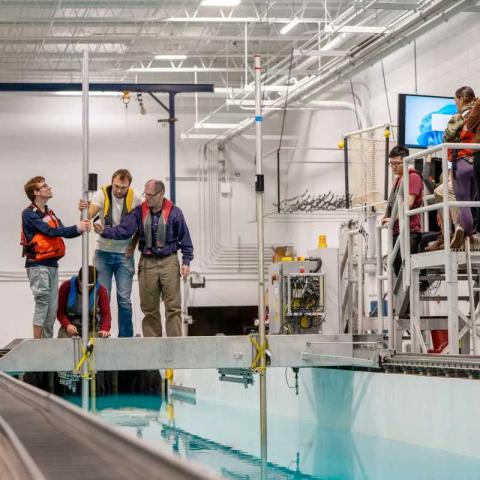
Learning By Doing
We combine analytical thinking with hands-on innovation, equipping you to tackle complex challenges and drive advancements in science, engineering, and technology.
-

There are a million reasons why you should choose UNH's
College of Health and Human ServicesHere are our top 10...
-
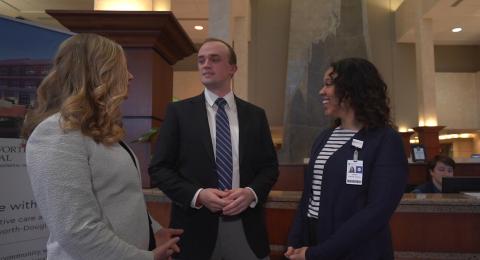 10
10Graduating with real-world experience
-
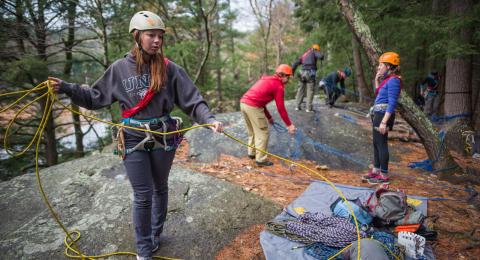 9
9Recreation Management and Policy program ranked #1 in New England
College Factual -
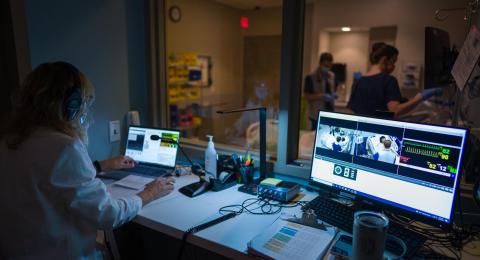 7
7State-of-the-art facilities where you’ll hone your skills
-
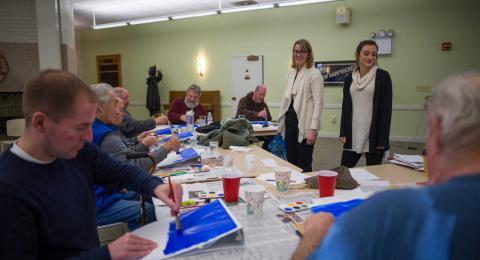 6
6Top-40 Occupational Therapy Program
US News and World Report -
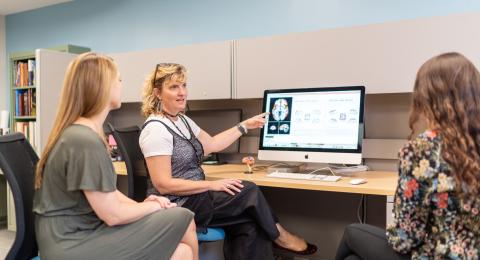 5
5Opportunities for research with faculty who share your passion
-
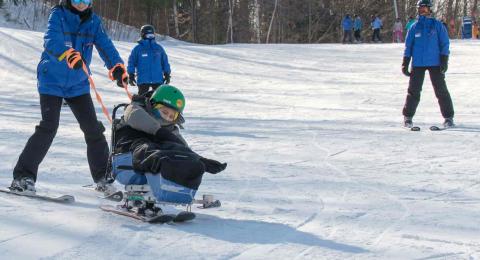 4
4Unique internship opportunities
-
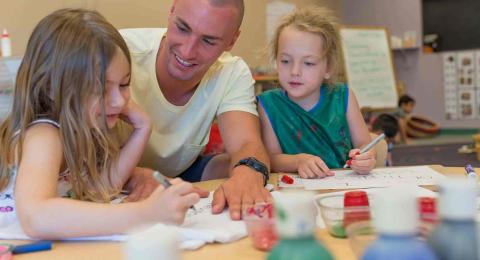 3
3Field work experience with real clients
-
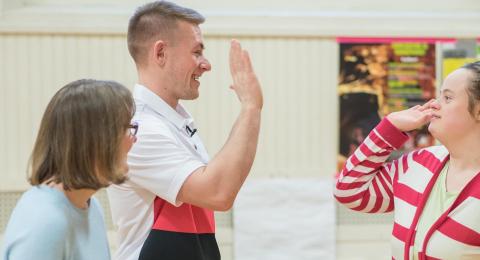 2
2Having a positive impact on the community
-
 1
1Grads have a 97% success rate (employment or furthering education)


Ready to take the next step?
Let's make it official! Here are some helpful links and resources to get you one step closer to becoming a UNH Wildcat.
Get in touch and we will get back to you as soon as we can.
College of Health and HUman services Virtual Class
Dr. Barbara White from our Occupational Therapy department will offer a lecture from her popular class, Stressed Out. Stress and Health: How does “stress burden” shape your immune system and increase vulnerability to disease? Join this informative and engaging class and explore these important topics with Dr. White and some of our current OT students.
Wednesday, March 31 | 4-5pm
Register today
Join Us
At the College of Health and Human Services, we are preparing the next generation of health and human services leaders.

Occupational Therapy - U.S. News and World Report

Recreation Management and Policy – College Factual

Health Management and Policy – College Factual
Research. Study Abroad. Internships. Our many scholarships support students who are doing great things.

Our Ambassadors provide guidance to the Dean, showcase the incredible pride in our college and serve as representatives at numerous events and activities throughout the year.

With an uncommon commitment to personal and professional development, CaPS empowers students to proactively build the knowledge and skills they need to succeed in an ever-changing future.

Professional academic coaches and student peer mentors provide support and guidance to help our first year students successfully transition to college, navigate academic resources and explore career options.
